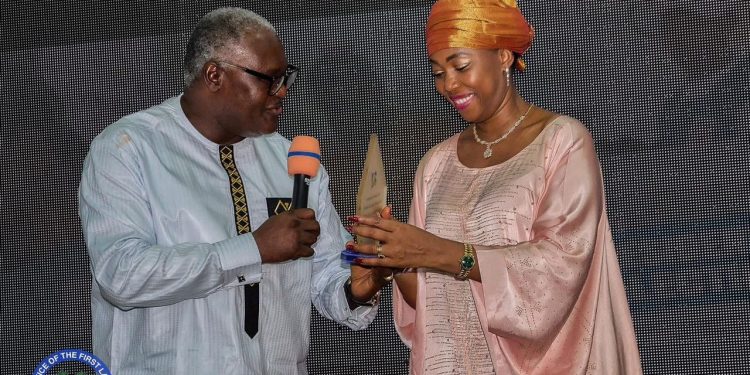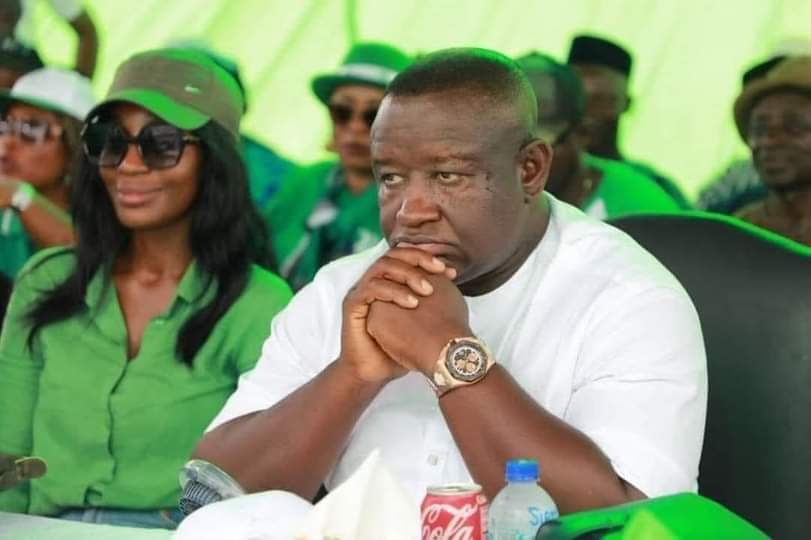First Lady Fatima Bio, representing the Human Rights Commission-Sierra Leone (HRCSL), presented a prestigious Human Rights Award to Joseph Fitzgerald Kamara (JFK), a renowned legal expert and a key figure in the All People’s Congress (APC). The exchange was more than just a ceremonial handover—it was a moment that captured the attention and imagination of both attendees and the nation.
On Tuesday, 10th December 2024, the Bintumani Conference Centre in Aberdeen, Freetown, the award stood as a beacon of national recognition and honor as HRCSL celebrated Human Rights Award Day.
Among the many highlights of the day was a significant moment that stirred hope, admiration, and conversations about Sierra Leone’s political future. As First Lady Fatima Bio gracefully handed the award to JFK, her radiant smile and poised demeanor left many observers awestruck.
The smile she wore was not merely one of formality or professional courtesy, but one that carried layers of meaning. It seemed to signal admiration, trust, and perhaps an acknowledgment of JFK’s potential as a transformative leader.
To many, that smile symbolized more than just the spirit of the event—it was a metaphor for the possibility of power transitioning smoothly from the current administration under President Julius Maada Bio to the opposition APC, led by JFK.
Photographs and videos of the event quickly circulated on social media and in traditional news outlets.
What stood out most was the First Lady’s captivating smile. Looking keenly at the imagery, one could interpret it as a silent yet powerful endorsement of JFK’s leadership qualities. Her body language was calm, composed, and dignified, exuding a sense of respect and admiration for the man who received the award.
The singular moment resonated deeply with many Sierra Leoneans and political analysts alike. The joy and warmth with which Fatima Bio handed over the award suggested a level of confidence in JFK’s capacity to lead Sierra Leone into a brighter future. It was as though, for a moment, political divisions melted away, replaced by a shared vision for the nation’s progress and adherence to democratic ideals.
JFK, a man widely known for his legal acumen, anti-corruption advocacy, and unwavering commitment to justice, stood tall as he received the award. His composure and the genuine smile he returned to the First Lady painted a picture of mutual respect. JFK’s demeanor was that of a man prepared for greater responsibilities, one who understands the weight of leadership and the expectations of a nation yearning for change.
Over the years, JFK has built a reputation as a man of integrity and fairness, qualities that resonate deeply with the aspirations of many Sierra Leoneans. His ability to connect with people across political, social, and economic divides has positioned him as a unifying figure, a trait evident in the way he accepted the award with humility and grace.
The Human Rights Award Day is a significant occasion in Sierra Leone, recognizing individuals and institutions that have made remarkable contributions, promoting and protecting human rights.
For JFK to be honored on such a platform underscores his commitment to justice, fairness, and the rule of law. It is a testament to his enduring efforts to uphold the principles of human rights in a country still grappling with the legacies of inequality and marginalization.
Fatima Bio’s role in presenting the award added another layer of significance. As First Lady, she has often been at the forefront of initiatives aimed at improving the lives of women and children, making her a powerful symbol of advocacy and empowerment. Her involvement in that moment elevated the award’s importance, signaling a broader commitment to unity and progress beyond party lines.
In a country where politics is often marked by deep divisions, the moment between the First Lady and JFK was refreshing and symbolic. It hinted at the possibility of a peaceful transfer of power and the continuity of democratic governance. Observers noted that Fatima Bio’s warm gesture could be seen as a reflection of her belief in JFK’s ability to lead Sierra Leone toward a prosperous future.
Many Sierra Leoneans interpreted the event as a subtle message of unity and reconciliation. It was as though the First Lady, in her role as a national figure, was signaling the need for collaboration and mutual respect among political actors. Her smile, composure, and the manner in which she conducted herself spoke volumes about her hopes for the country’s future—a future that might very well include JFK at the helm.
The event has sparked widespread discussions across Sierra Leone. Supporters of JFK and the APC view the moment as a sign of growing recognition of his leadership potential. On the other hand, SLPP loyalists see it as an affirmation of the First Lady’s grace and commitment to national unity, irrespective of political affiliations.
Political analysts have also weighed in, suggesting that the moment could serve as a turning point in the nation’s political discourse. It has reignited conversations about the importance of peaceful transitions of power, the need for leaders who prioritize the nation over party interests, and the role of women like Fatima Bio in fostering unity and hope.
Smiles are powerful symbols, often transcending words in their ability to communicate. In this context, Fatima Bio’s smile represented more than just a fleeting moment of joy. It was a symbol of possibility, a signal of hope for a brighter Sierra Leone. It spoke to the idea that, despite political differences, there is a shared vision for a country where justice, democracy, and human rights prevail.
For many, the smile was a reminder that leadership is not just about policies and promises but about the ability to inspire trust, confidence, and belief in a better future. JFK’s response, equally composed and genuine, reinforced the narrative, showcasing him as a leader ready to rise to the occasion.
As Sierra Leone approaches a critical juncture in its political journey, such moments provide a glimmer of hope. They remind us that, at its core, leadership is about service to the people and the pursuit of a shared vision for progress. The interaction between Fatima Bio and JFK at the Human Rights Award Day was more than just a ceremonial exchange—it was a powerful statement about the possibilities that lie ahead.
Whether interpreted as a sign of changing political tides or simply a moment of grace and unity, the event has left an indelible mark on the hearts and minds of Sierra Leoneans. It is a testament to the power of gestures, symbols, and the enduring hope for a future where leadership transcends party lines and focuses on the greater good of the nation.
As the nation continues to reflect on such a remarkable moment, one thing is clear: the future of Sierra Leone is bright, and leaders like JFK are poised to play a pivotal role in shaping it.











